Delivering true value for businesses, CRM is widely used by enterprises of all sizes and industries. According to statistics, using CRM software can increase sales revenue by up to 29%, elevate sales productivity by 34%, and enhance sales forecast accuracy by as much as 42%.
This is why CRM development has become a top priority for businesses today. To assist businesses in understanding how to build a CRM system, let’s explore the various approaches to building CRM with detailed steps, costs, and important considerations in the following article.
What is CRM Development?
CRM stands for customer relationship management. CRM software helps businesses manage customer data such as contact information, preferences, purchase history, and communication records. With CRM software support, businesses gain a comprehensive understanding of their customers to create targeted marketing campaigns or develop personalized interaction pathways.
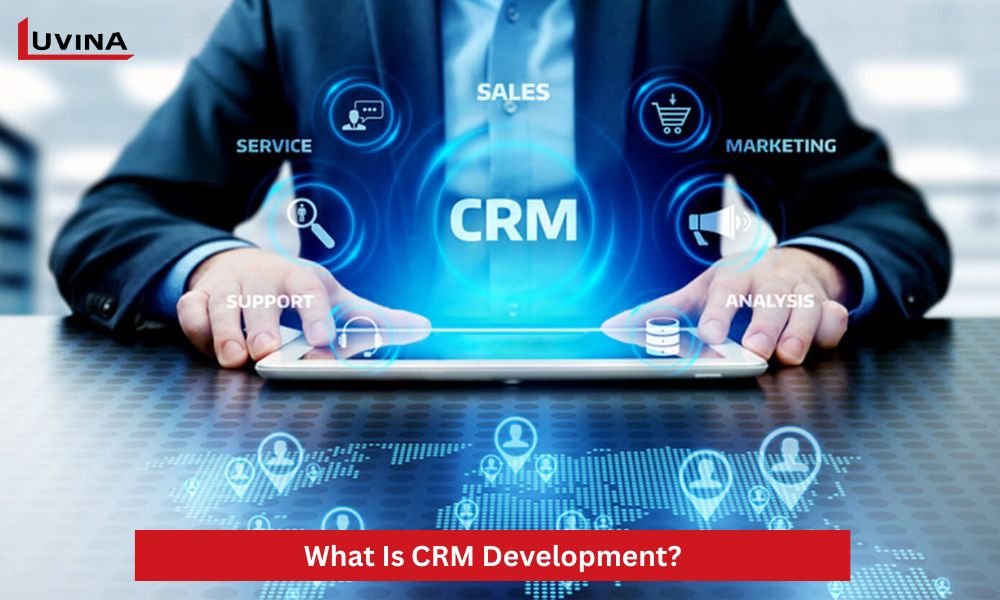
CRM development is the process of creating CRM software systems. These programs are designed and customized for businesses across various industries with different requirements to manage customer interaction activities.
Benefits of CRM System Development
Every business can immediately benefit from using CRM software. Compared to manual customer management methods, CRM system development brings specific benefits, as follows:
- Strengthening customer relationships
When businesses have detailed information about customers’ preferences, shopping habits, purchase history, etc., they can easily tailor services and interactions to best suit each customer. The more personalized the sales and service approach, the stronger the relationship between the business and the customer becomes.
- Improving customer service
CRM ERP development allows businesses to access customer profiles and provide detailed information. Consequently, businesses can promptly offer highly personalized support, efficiently resolve complaints, and carry out customer care services automatically combined with manual tasks, enhancing customer satisfaction.
- Increasing sales efficiency
CRM product development also helps sales staff streamline workflows and sell more effectively. The CRM system also provides sales data for businesses to adjust and improve sales methods, leading to rapid sales growth.
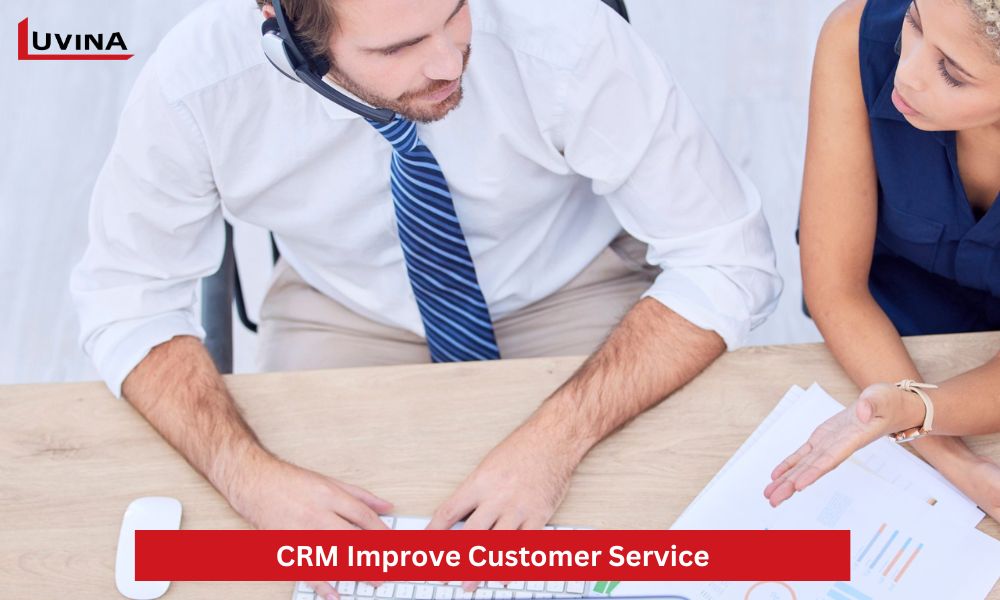
- Building a sound marketing strategy
With information about potential customers and their interaction history provided by CRM software, businesses can create more targeted marketing campaigns, tailored to specific customer segments, thus achieving more effective targeting.
2 CRM Development Approaches
When planning CRM development, businesses must choose between 2 options: ready-made solutions available on the market or CRM software development. Each approach has its advantages and disadvantages and is suitable for different needs and purposes. So which option is better for the business?
1. Ready-made
Ready-made CRM development platforms offer superior solutions for managing customer relationships. These platforms typically come with basic features such as customer information management, sales tracking, customer support, etc. Some of the most popular ready-made CRM ERP development platforms today include HubSpot, Salesforce, NetSuite, Oracle, Odoo, etc.
The ready-made approach is easily implemented, with features suitable for various industries. However, these solutions lack flexibility and are often unable to meet specific business needs.
2. Custom CRM
On the contrary, custom CRM product development solutions are tailored to the specific requirements of each business. Customized systems can flexibly integrate various features and functionalities, creating unique processes tailored to the workflows of each organization.
Custom CRM solutions help businesses adapt quickly to the changing demands of the market and gain a competitive advantage. However, compared to ready-made systems, developing custom CRM systems also requires more time, effort, and financial investment.
The choice ultimately depends on each business. What may be highly beneficial in one scenario could be less effective in another. For instance, if you have a startup company, ready-made CRM solutions may suffice. However, as your company grows, expands its scale, and undergoes changing business requirements, you’ll likely need a custom CRM system.
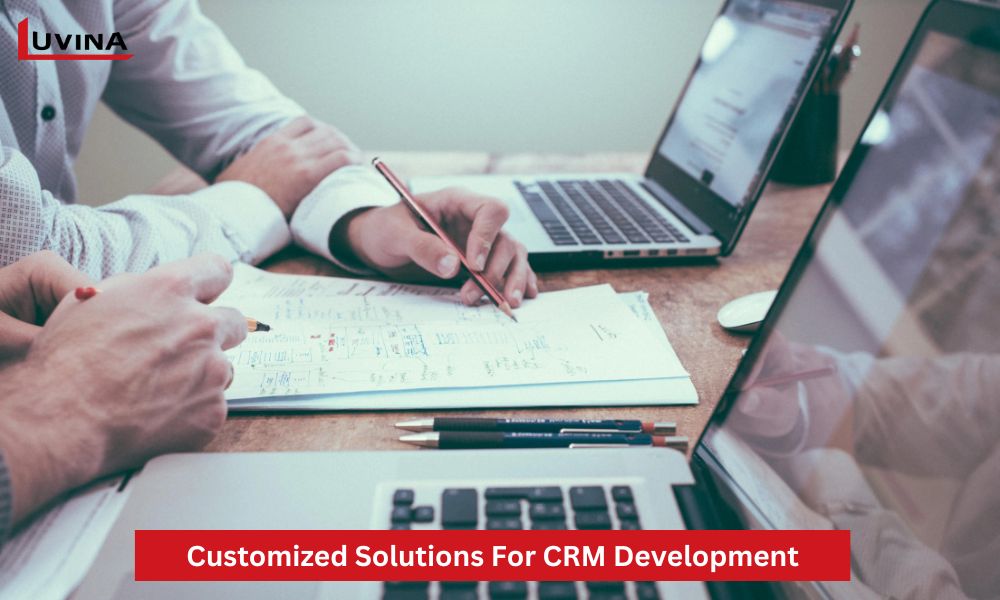
To determine which approach suits your business model better, consider the following 3 factors:
- Tasks and objectives: If the features of a ready-made CRM system meet your objectives, you may consider implementing ready-made solutions. However, if you require a CRM system with features tailored to specific business needs, you’ll need to develop a completely new custom CRM system with customized features.
- Cost: Custom CRM development can be more expensive. The more complex the features, the higher the cost. However, you’ll typically make a one-time large payment. On the other hand, using available solutions may incur lower fees, but you’ll have to pay regular monthly or yearly payments (depending on the subscription package you choose).
- Business strategy: Your future business plans will determine which approach to take. If you plan to expand your business scale, add features to expand the system, or hire additional staff, custom solutions would be a more appropriate choice.
CRM Development Process
Building a CRM system tailored to the needs of customers can help businesses manage customers better, giving an advantage to the sales team. To develop an effective system, you need to follow a disciplined development process, step by step. Here are the five basic steps of a CRM development process that you can refer to.
Step 1 – Discovery and Planning
This is the stage where thorough research is conducted to understand the business needs and outline a plan for CRM product development. It’s essential to develop the plan as early as possible and make it as detailed as possible to avoid wasting time and money. This step will also help the business identify priorities in the CRM development process.
Some tasks to be performed during this discovery and planning stage include:
- – Identifying the sales process
- – Mapping out the business process
- – Budget estimation
- – Documenting detailed feature requirements
These tasks may take a few days to complete. The more detailed the information, the more accurate the plan for CRM development will be.
Step 2 – Research and make a list of CRM vendors for CRM development
There are numerous CRM vendors in the market today, but not all vendors can provide what your business needs. Choosing CRM vendors depends on how well you understand your business and what your business requires from a CRM system.

To research and compile a list of CRM vendors for CRM development, you can search online, ask acquaintances, or even study the CRM systems used by competing companies. The more information you gather, the easier it will be to make a decision.
Step 3 – Evaluate the demos provided by vendors
You need to engage with several CRM vendors you’ve selected to obtain demos for the CRM system. When reviewing these demos, you’ll get an idea of how the system will look and whether it’s user-friendly. The demo will accurately reflect how the vendor handles your system requirements, making it easier for you to choose vendors.
Step 4 – Choose CRM Vendors and CRM Solution
Based on the demos and how the solutions are presented, select the CRM vendor that best suits your needs. This is also the stage where you need information on the cost of CRM development based on the requirements you’ve provided.
Step 5 – CRM Implementation
The implementation stage is when the system, built according to your requirements, begins to take shape. The method of CRM implementation will vary depending on each business and vendor. During the implementation process, remember to:
- – Prioritize handling high-priority business needs at the beginning.
- – Allocate ample time for testing and training before putting the CRM system into operation.
- – Regularly maintain and update the system after implementation.
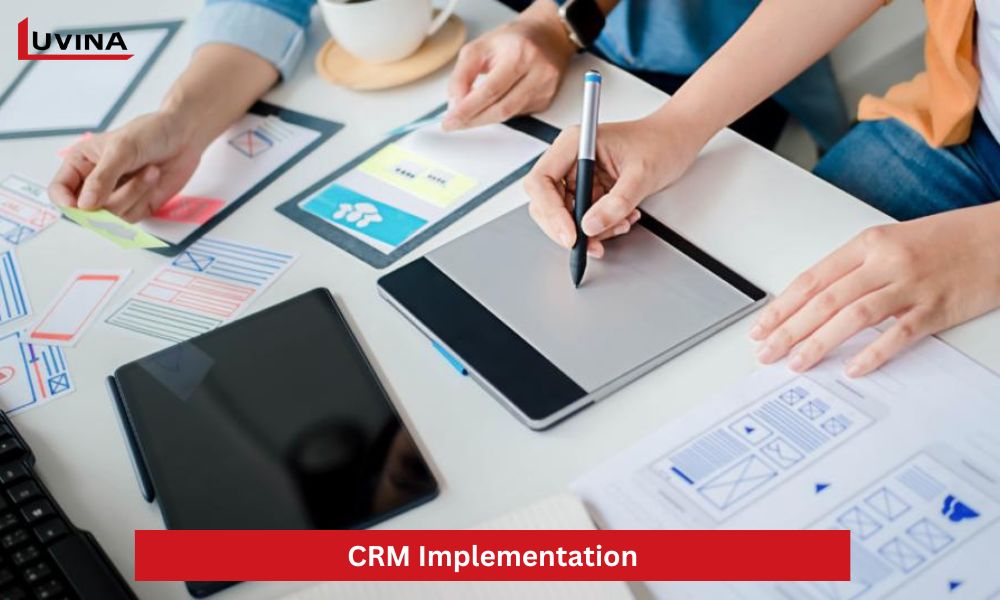
Cost to Develop CRM System
Developing a CRM system involves various costs, and the specific amount depends on the approach taken. Ready-made solutions generally incur lower costs compared to custom systems. The cost of developing a custom system also depends on factors such as features, number of users, business scale, maintenance fees, expansion needs, etc. Below is an overview of CRM development costs for different business scales to provide a clearer picture:
| Time | Budget | Notes | |
| Simple Custom CRM Development | Several weeks to a few months | About $20,000 USD | This type of custom CRM system typically includes features like online payment, scheduling, automated email and SMS systems, HR management, and customer history tracking. |
| Standard (Average Complexity) Custom CRM Development | At least a few months (exact time depends on system complexity and features) | Approximately $110,000 USD | This involves paying developers with average salaries ranging from $35 to $40 USD per hour. Costs may increase by 1.5 to 2 times if hiring developers in countries like the US (with salaries ranging from $70 to $100 USD per hour). |
| Highly Customized (Complex) CRM Development | Several months | Up to $690,000 USD | Highly customized systems often include features such as automation, data analysis, etc. The costs for complex customizations significantly impact the overall development expenses. |
>> Read More: Understanding The True Cost Of Implementing CRM System
What to Consider Before Developing CRM Software?
To develop a quality CRM system that operates efficiently, beyond having a good development team and completing all development stages, you also need to consider the following:
- User interface
The CRM system should automate business activities rather than create difficulties in usage. Therefore, create a clear, convenient, and user-friendly interface to ensure your employees can understand and use the system easily without needing complex instructions.
- Integration with internal software
Ensure the new CRM solution can integrate with the internal software systems your business is currently using. This will streamline software systems and simplify technical maintenance.
- Cloud-based solutions
Consider developing cloud-based solutions when customizing CRM solutions. Using the cloud allows businesses to store larger data volumes while optimizing costs.
- Maintenance after CRM development
CRM software development is complex, and even though it’s thoroughly tested, errors can still occur during system usage. Pay attention to post-project maintenance tasks to immediately address any issues that may arise and avoid disrupting business processes.
- Choosing a CRM development company
To ensure the success of your CRM system development project, you need to partner with a reliable CRM development service provider. Reliable partners not only handle technical aspects but also help analyze competitors, optimize cost-effective plans, and propose suitable features.
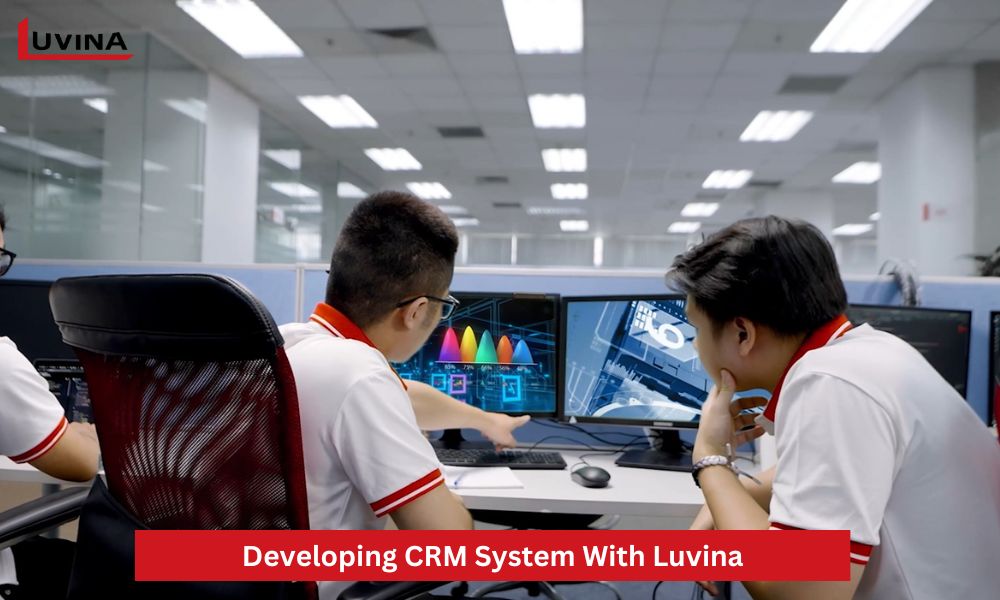
With nearly 20 years of experience collaborating with clients in Japan, Luvina provides custom CRM solutions to help businesses enhance customer interactions and drive growth. Luvina specializes in Salesforce CRM, an extremely powerful and flexible CRM platform. Based on your business needs, we will leverage our expertise to design the most suitable solutions. With Luvina’s assistance, businesses can optimize customer interactions, streamline sales processes, and achieve impressive CRM results.
Contact Luvina now to discuss the CRM development solution your business needs.
Summary
Hope this article has helped you understand the CRM development process and important considerations for an effective CRM system. With the significant benefits CRM brings, developing such a system has become increasingly popular in recent years. If you don’t want to be left behind in a constantly changing business market, start planning CRM system development today to enhance your business prospects.
Related Posts:









Read More From Us?
Sign up for our newsletter
Read More From Us?
Sign up for our newsletter